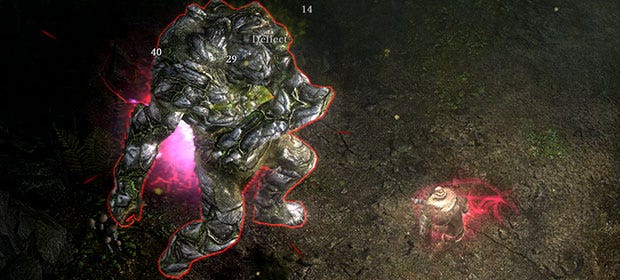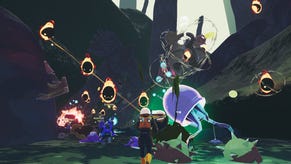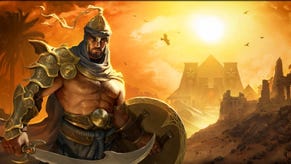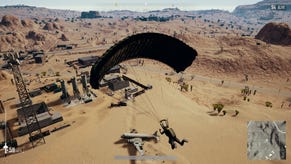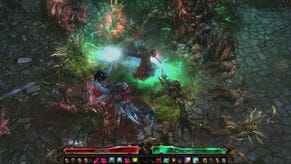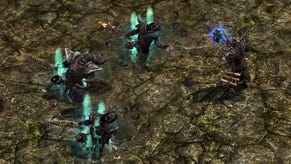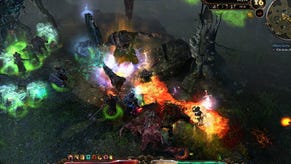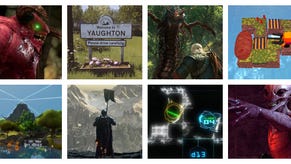Impressions: Grim Dawn
I hope the sequel's called Cheerful Dusk
Lots of grim, not too much dawn so far. Which is a shame. Dawn's so pretty. Might lift the spirits after all that zombie-twatting in the gloom. Still, that is what we've signed up for: Grim Dawn, an action RPG created by much of the team (and the tech) behind Titan Quest, is here to be our alt-universe Diablo III. No fancy business models (other than Steam Early Access), no unorthodox DRM (other than Steam), no drowning in lore and cinematics, no slickness at the expense of all else: just getting on with the zombie-twatting. Spiders too, naturally.
I've got to be honest, I find writing about action RPGs hard work. They don't elicit tales of high adventure or great introspection, because their primary purpose is, even within a medium already broadly dedicated to that purpose, a boredom-killer, a way to make time disappear without feeling overwhelmingly guilty about it. A more technical mind than mine could, I'm sure, could find plenty to say about the feedback, the UI, the balance; me, I'm stuck with that nebulous concept of 'feel.'
Does Grim Dawn, whose first 'chapter' has been out on Early Access for a little while now, 'feel' right? Does clicking upon a monster and having it recoil, strike back or die 'feel' satisfying and tactile? That is what an action RPG lives or dies on, the pinata concept of hitting something until it splits open and potentially showers candy about the place. Blizzard North defined that feel in the first Diablo decades ago, and any ARPG since cannot help but emulate it.
Yes, Grim Dawn feels right. Perhaps not quite as right as Titan Quest did, but that may be because it's gone for a grubbier, nastier feel, more of a sense of ruin and desperation in the art and which somehow affects the combat too. It feels dirty, and very physical. This is a matter of light and sound creating something that feels very different to the shiny tooniness of Diablo III, even though the essential actions are the same. Indeed, Grim Dawn's sound is a big part of its snarling charm - sombre music and escalating sword-swipe beats, the muted thunder of kicking open a barrel, the dank sounds of the underground. None of this is new for an action RPG, but the attention to detail is here, and it makes me feel enough like I'm in a place rather than on a numbers hunt.
Visually and it terms of written character it seems rather more lacklustre. As you can see, this means it takes an appalling screenshot. While it's not quite so dully chaotic in practice, there's too much emphasis on beyond-muted colours and excessive spikiness, which as well as making it actively difficult to work out who's stabbing who half the time, sadly undermines the careful detail and slightly retro-tiled look of the environments. This approach is especially true when it comes to enemies. They all seem so forgettable, and so short on flavour. A Bone Rat is a rat with spiky bits. A zombie soldier is called a Zombie Soldier. A Giant Mosquito looks like a big mosquito and is described as 'insectoid.' No shit, Sherlock. A Giant Spitting Spider is a giant spider which spits at you. Hence, it's called Giant Spitting Spider. Because it's a giant spider which spits at you. So it's called Giant Spitting Spider. Because it's... well, I kinda worked it out for myself, thanks. Dull names for dull foes.
Yeah, it's Early Access and all that entails/excuses - though it's one of the slicker, more complete feeling Early Access game I've played - but the armchair producer in me says it could really do with a second, more enthusiastic pass on beastie descriptions, even if the deflating, obvious creature design is undoubtedly locked down by this point. I might sound a little anal on this front, but this stuff matters - you want to feel like you're adventuring in a strange land inhabited by strange beasts, not swiping at stuff that's rolled right off the Fantasy Action Game production line. There's no sense of wonder here.
Quests feel a little too messy too, though the direction they're aiming for is a noble one. I really appreciate that objective locations aren't handed out on a plate, and often require paying some close attention to dialogue and maps - there's no automaton-trudging to a distant icon, and careful spacing/randomising of quest-specific foes means farming isn't viable. Against that is too much progress hangs around squinting at the minimap to ascertain the one passage or road that isn't blocked off, or to find a path that was so narrow or visually obscured you walked right by it. I suppose avoiding that sort of thing is what a sky-high budget and a terrifying amount of QA and focusing grouping are for, and I'd rather imagine Grim Dawn hasn't enjoyed those. So I won't begrudge it too much, but it is worth accepting that completing quests can be something of a war of navigational attrition rather than a joyous tally-ho of boss-nobbling.
It's the combat and the skill tree that the Grim Dawn's most grabbed me and refused to let me go, to the point that this piece is running two days later than intended due to the cheerful curse of Just One More Go. I suspect I'll be proven wrong in this by more long-term devotees of the game, but I'm finding that levelling seems more geared towards building a character and skillset that I personally enjoy than it is unwavering fealty to specific builds. Clearly I'm referencing Diablo III again, and the constant comparison is a little rude to Grim Dawn, but I do think it's appropriate rather than lazy. Torchlight 2 was one alternative, going full throttle for excess, whereas this seems like the other other option - more focused on tinkering and self-specialising than either of its rivals-apparent.
I don't want to rip all the fun out of the skilltree by painstakingly describing it, but I think it hits a complexity sweetspot, neither falling into exhausting overload of choice or essentially forcing you down one route or another if you mean to remain effective. My character's a Witchblade, which, as well as meaning she looks like a member of a biker gang trying to do Warhammer cosplay, involves her having a few skills from the Occultist tree and a few skills from the Soldier tree, thanks to the option to dual-class come level 12.
This in layman's terms means she can twat stuff that with a big club that does mega-damage every third strike, while a summoned raven and a summoned hellhound perform crowd control and heal her. Also she can throw a giant poison eyeball at things. It's probably a right old mess when it comes to efficiency, but it's such a thrilling way to be a lazy bugger - all I really need to do is hit stuff over and over and over again, but the presence of my bestial chums and a few tricsky black magic spells means it never feels like a game in which one character hits stuff over and over and over again. I've got all kinds of scope to be more tactical or more specialised if I want, but as it is I am completely free from both the worry that I'm not building The Right Character and that I'm coasting through. Moreover, the aforementioned use of sound has all the right melodic thumps and squidgy noises that it feels so satisfyingly physical. The personality that's a little lacking on the art and description side of things is unquestionably present and correct where it arguably most counts.
I've also found myself helpessly obsessed with the socketing system, because it has such big effects - bigger even than equipping a whole new weapon or armour piece. You can equip a found magic component to almost any piece of gear, though some are only suited to weapons or armour, and have an immediate effect, but find three matching components, attach them all to the one item and you'll get a mega-boost which makes a serious difference. In the case of weapons, it'll often grant you a bonus ability, such as a poison bomb or ice spike. What this means is that there's a steady flow of change: you're not simply building to a fixed place on the skill tree, but irregularly mixing it up.
Also, the Great Hunt that characterises aRPGs is now focused more on finding specific components than it is on praying for a random weapon to drop with roughly the right stats. It's a minor deviation from the genre norm, but a meaningful one, enough to give what is, at its heart, the same experience we've had since the mid-1990s, a slightly different feel that doesn't stem from graphics or cutscenes or auction houses.
To put all this rather more simply, Grim Dawn's the action RPG I've enjoyed most in quite some time, and I'm very keen to try the later chapters as they're released. More so than Torchlight 2, which was a bit too much of a sugar rush experience for me, and certainly more so than Diablo III, which regardless of business model controversies seemed to these tired eyes so polished as to be almost ephemeral. Perhaps my enjoyment's down to having had a lengthy break from games like this, as in recent months I've concentrated more on disappearing down the rabbit hole of introspective titles, and now I'm coming up for slap-happy air. Even so, while stylstically Grim Dawn lives up to its name a little too well, I do think it's a truer heir to Diablo 1&2 than any of its recent rivals and in doing so it's very adeptly filling a vacuum in our gaming lives.
Grim Dawn's out on Steam Early Access now, for £21. It's only the first act for the time being, but I was pleased to find that lasts a good long while, and what's there has seemed essentially finished and light on bugs.
